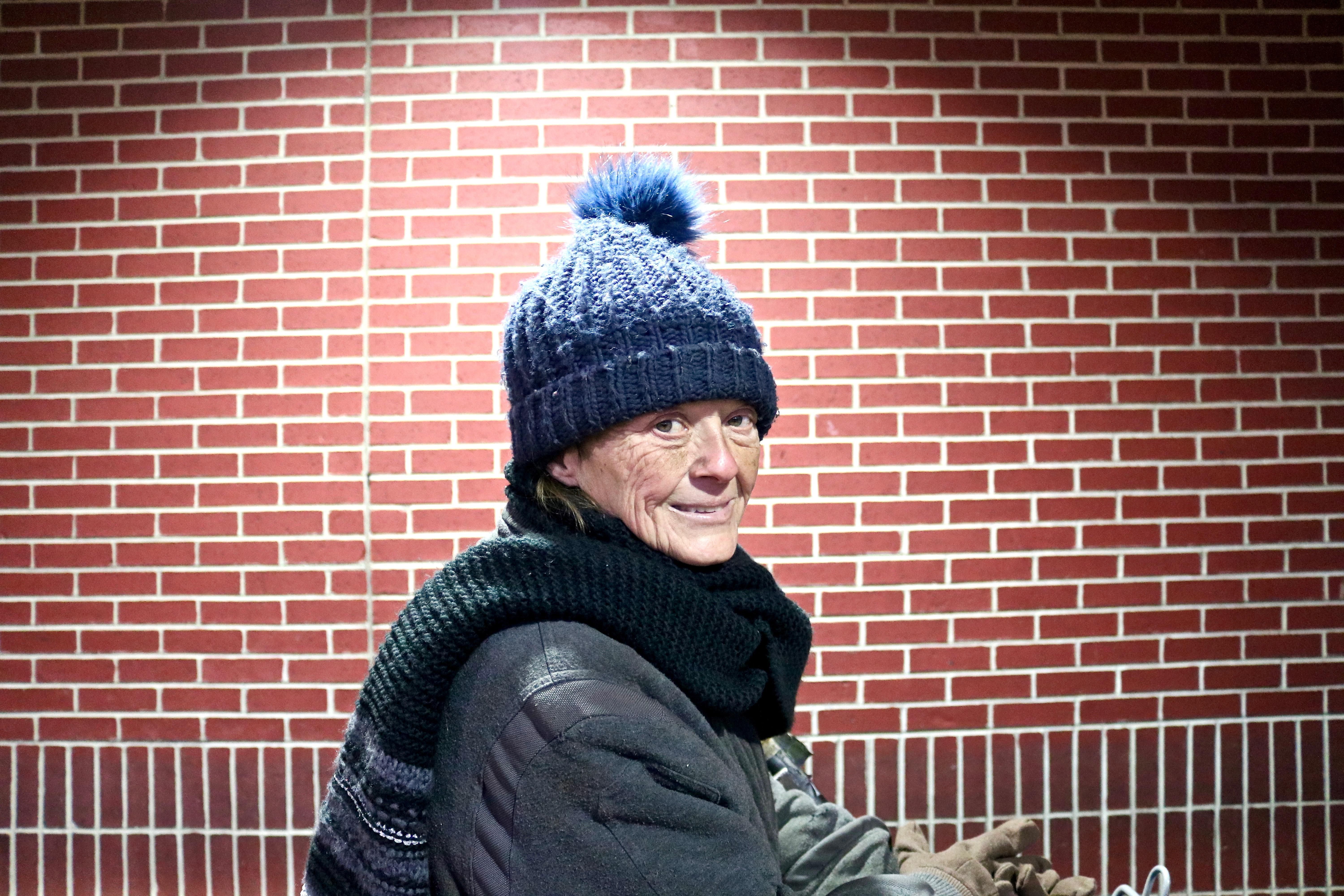In the middle of a cold Kentucky winter while most were trying to stay warm, Judy Cardwell stole a bag of ice from a Kroger in Bowling Green. Police officers apprehended Judy and charged her with petty theft, but she never served any time.
Judy, 55, was diagnosed with diabetes a decade ago, and she needs ice to keep the insulin in her little red and white cooler at a low temperature. The arrest for stealing ice was a little over a year ago; she’s had 8 diabetic attacks in just over the 3 years. Getting access to insulin is difficult. If the insulin she receives from disability is not kept cool, the heat will deactivate the chemicals and the insulin won’t work.
Judy has been living on the streets for over two decades. Four years ago she met and started dating her current boyfriend Randy Kalman, a 38-year old Detroit native and drug user. She credits her much younger boyfriend Randy for her ability to make it from one day to the next.
“I ain’t got a good body,” says Judy. “I’m sick sometimes but Randy keeps me OK. He keeps me safe from everybody out here on the street, and there’s some bad people out here.”
Judy and Randy’s “home” for now is in a trailer in the back of an old semi-truck that’s been abandoned on EH Harris Lumber Company’s property a few miles from Riverwalk Park where they used to live.
The owner of EH Lumber Company, Phil Price, lets them stay in the old semi’s trailer at no cost.
“Just so long as they don’t cause me any trouble I don’t see why they can’t make their home there,” says Price about the couple living on his company property.
Judy is proud of their little set-up in the trailer. The truck is filled with cushions that Randy installed to make the place feel more comfortable. There are wads of old clothes and trash piled around the trailer, inside and outside.
The couple uses a propane tank to keep warm in the winter, and they dress as sparingly as they can in the summer to endure the heat. Judy says Randy does everything for them, including collecting and selling scrap metal for money, finding food, scoring drugs, and even keeping Judy warm when temperatures drop.
“Oh, he keeps me warm,” laughs Judy, who’s sitting cross-legged by the mouth of the trailer. “He’s like a little heater. He’ll just curl up next to me and I never even feel the cold.”
Randy putters around the trailer cleaning up bits of trash and stacking cans of food neatly in the corner. He says he does his best to keep the place safe for Judy and make the trailer feel like home, but it’s not as easy as it sounds.
“She’ll try to go back and stay in the truck by herself at night without me there, but I don’t let her,” says Randy. “That’s why I wish I could do something more for her. I wish I could give her something more.”
Judy and Randy are one of Bowling Green’s most unusual couples. Despite Judy’s serious medical condition and the couples’ continual use of illicit substances, she and Randy have managed to survive being homeless for the four years they’ve been together.
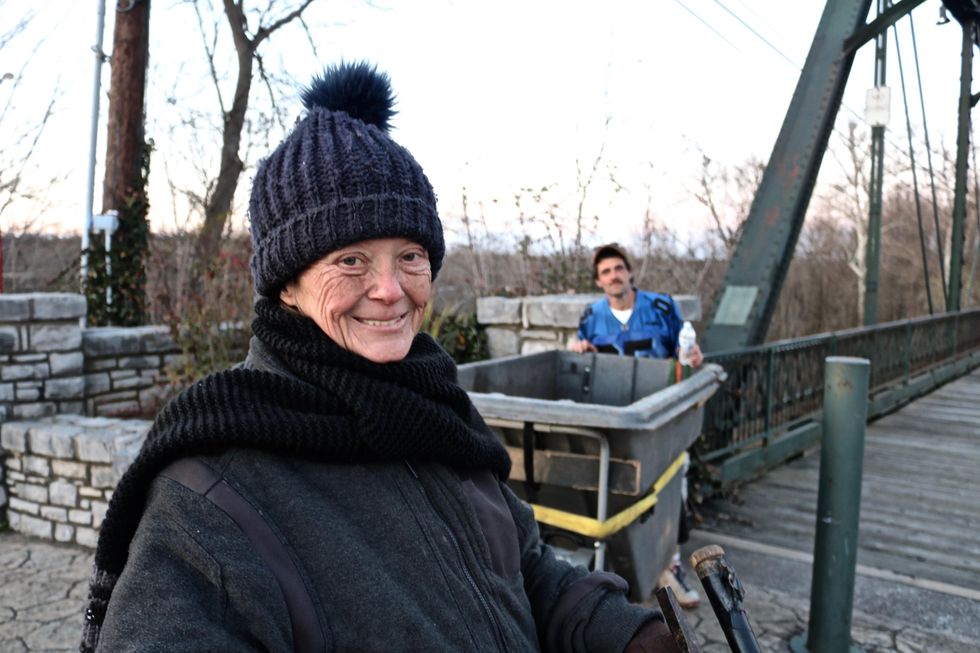
Homeless Kentuckians like Judy and Randy struggle every day to find shelter, fight disease without healthcare, and feed themselves without a steady income. The number of homeless people in Kentucky has nearly doubled since 2014, increasing from 2,200 to just under 5,000 in recent surveys. In the homeless count done by the KHC this past January, Warren County had a total of 72 homeless people in the Barren River area.
Western Kentucky University student Elizabeth Bell, 30, from Dallas, remembers the summer of 2016 when she first met Judy and Randy who were, at the time, living in a tent under the bridge in Riverwalk Park. She often visited them to bring cans of food, clothes and other essentials.
“They’ll tell you ‘we just make it day by day,’” says Elizabeth. “Well, what do you make it day by day with?”
Brandon Render, the former chair of the Homeless and Housing Coalition of South Central Kentucky, a collection of community partners that work with homelessness and housing, believes it’s the fault of the city that couples like Judy and Randy end up on the streets.
“We tried to influence housing policy at the local level and advocate for low-income families,” says Render.
Render was responsible for coordinating programs like the Room in the Inn Winter Shelter Program, which partners with church congregations during the winter months to provide emergency shelter services for those living on the streets.
There are homeless housing programs in Bowling Green and the state of Kentucky that cater to the homeless population. Judy and Randy spent a good bit of time going to these shelters that offer beds and food and even extended stay programs.
Salvation Army head Captain Phillip John Winter helps hundreds of homeless residents like Judy and Randy in the Bowling Green area every year. The Salvation Army shelter is a 75-bed shelter with six family units and 12-night emergency programs. If residents want to stay longer they have to be looking for work.
“Not everyone that comes is homeless, some are just low-income,” says Winter.
Over 1,000 people stay at the shelter and over 60,000 meals are served annually.
Judy and Randy spend a cold, March morning scavenging for scrap metal and picking up trash before rendezvousing at the bridge in Riverwalk Park. The bridge is sentimental to them because it provided them shelter, and it acts as their headquarters throughout the day. Judy, with her shopping cart, meets Randy, with his giant blue dumpster, after a successful day of collecting trash and scraps.
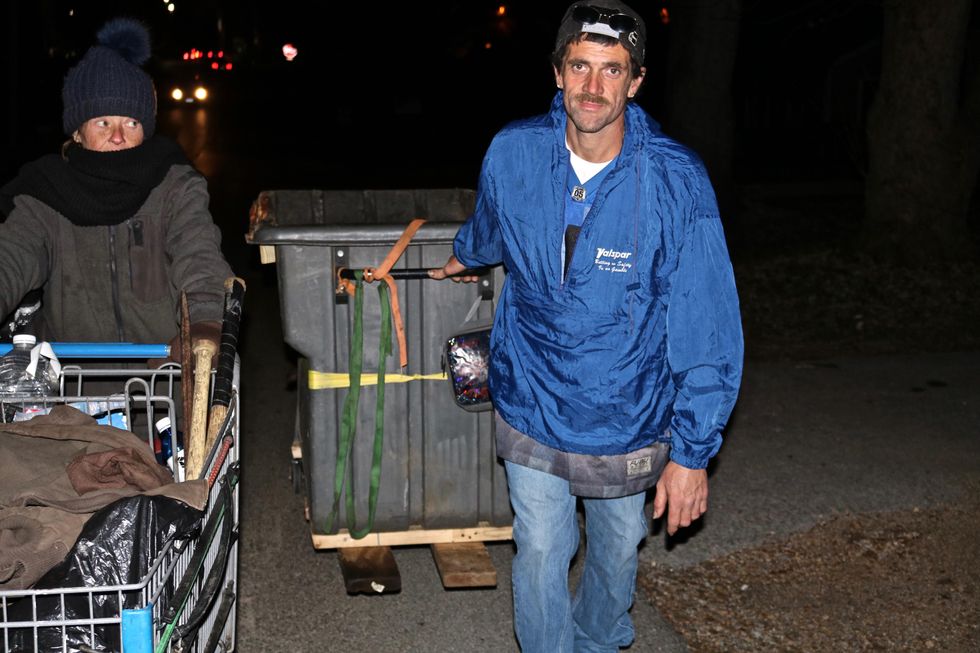
Randy’s dumpster is filled with pieces of wire and other metals. He and Judy head to an old motel on the strip to find some more scraps before they eat dinner. Behind the motel, Randy hops into a green dumpster and starts looking for anything of value.
Judy can’t climb. She’s too weak. So she just watches Randy from the road.
“He’s like a little monkey,” says Judy. “Jump in, jump out!”
Randy sometimes spends the entire night scavenging around town for metal. He takes the steel, aluminum, brass, copper and other metals that finds to scrap yards and sells them for as much money as he can get. Randy will fill three or four garbage bags full of insulated or copper wire, or even brass, before the day is over.
With a dismal look on his face, Randy comes running up and tosses a few metal screws into his little, blue dumpster. His dive wasn’t very successful but any amount of metal means some amount of money.
“Made $56 the other day. It’s a lot of money for just a little bit of metal,” says Randy.
Randy says that if he doesn’t make small repairs on damaged pieces of metal before turning them in to the scrap yard, he won’t make a good profit.
“If you don’t cut off the end part of the wire, they won’t give you as much for it. They call it a dirty wire.”
Randy pushes his dumpster up the sidewalk, around a corner, and down a side street as Judy follows behind.
“Well we do this pretty much every day,” Randy says. “All day we do this. Some people got to survive and live too.”
Randy says his parents kicked him out when he was 14 after they found out he was smoking pot. Judy says Randy has six kids with different women, but he never sees them.
“Don’t you honey? You got six kids?” Judy turns back looking for confirmation from Randy. Randy nods.
Judy and Randy met at a shelter in town and “fell for each other” almost immediately. The couple doesn’t seem to mind the 15-year difference in age. Randy has asked Judy to marry him, but she’s reluctant because her last two marriages failed.
“I love him to death and he loves me, and see I’m jealous,” says Judy.
Judy and Randy have both had it rough, which is why they say they made such a connection.
Judy especially has had her share of heartbreak. When she was just 6 years old, her father shot her in the stomach with his shotgun.
In 1968, Judy lived in a small house in Bowling Green with her mother and step-father. One afternoon, her stepfather Henry and her father Bill got into a heated argument over money while Judy hid in the backseat of Bill’s car.
Judy recalls hearing them yelling, and she peeked out of the back of the car only to see her father holding a shotgun. She heard the trunk creak open, the men’s voices still biting at her through the hot summer air. In fear, Judy’s stepmother ran in the other direction toward the back of the house along the untrimmed hedges.
Henry tried to make Bill stop and listen, but he refused, and in that moment Judy’s stepmother tripped and hit the ground hard before letting out a gut-wrenching cry. Bill cursed and threw the gun angrily into the trunk.
The next noise was the sound of a loud firecracker, followed by a silent ring that permeated everyone’s ears. The gun had gone off inside the trunk and the shell had blown a hole through the backseat and right through Judy’s stomach, she says. Her intestines were showing and Judy was screaming.
Bill rushed Judy to the hospital immediately, and doctors were able to save Judy’s life. Police took Judy’s father to jail but he was released five hours later, she says.
Judy currently gets $660 a month from disability because of her injury as a child, and she and Randy say they use a lot of the money to buy drugs. She carries trinkets like a hairbrush and pictures of family around with her because it brings back memories.
Judy was married twice, for the first time at 15. She dropped out of school in the eighth grade following in the footsteps of most of her other nine brothers and sisters.
She doesn’t stay in contact with her family anymore, but claims that if her father Bill were still alive today he would never have let her or Randy become homeless.
Randy’s father is still alive but isn’t around either. Randy says his father had 32 children, most of them by different women. Judy claims her father had just as many children if not more, and Judy herself was named after one of the women that her father had an affair and some children with.
She says her daddy cried every single night because he felt guilty for shooting her.
“If he was here, he’d be right here with us,” she says. “He’d make sure we had a place. We would not be homeless.”
Bowling Green resident and non-profit volunteer Shelly Adwell, 47, has worked for homeless shelters for years and spends most of her days working with homeless Kentuckians. She believes people get the wrong impression of the homeless, especially because the media and the upper class paint a false picture of them.
“I have seen multiple people on streets homeless get jobs and homes and none of the homeless people I help has ever asked for anything,” says Adwell.
Adwell says panhandlers are usually not homeless. Other non-profit workers like Adwell feel that it is panhandlers that create a negative image of people on the street, since, in her opinion, homeless people rarely practice pan handling. She says people should know the difference between the two primarily so they understand the homeless community more clearly.
Ronnie Ward, public information officer for the Bowling Green Police Department, says that when people commit crimes they’re not identified on police reports as homeless. They either put a home address or they don’t.
So there’s no accurate police report stat that tells how many homeless people with criminal records actually live in Warren County. Ward, however, says that along with the inability to document homeless people within the county, there is lost some accountability for others who aren’t aware of the issue.
“When people talk about the homeless population they think of people sleeping on the street corner but there’s a stigma that goes with that,” he says.
Judy and Randy head to the local Kroger downtown. The sun has started to set and Randy needs to change into something warmer.
At this very same Kroger eight months ago, Judy had a very bad diabetic attack. She collapsed on the bench outside the door leaving Randy feeling helpless. He slapped her several times to keep her from passing out and gave her a shot of insulin.
While waiting for Randy, Judy pushes her cart along the outside front of the store past the vending machines and all the shiny new grills and patio furniture for sale.
She catches the side of the cart on a lawn chair and struggles to free the metal basket from the chair’s leg. The racket brings an enormous amount of attention to her. Everyone suddenly notices the haggard looking homeless woman bundled up in a tattered, gray coat and pushing a shopping cart filled with scrap metal and baseball bats.
Judy parks her cart right outside the grocery-side door, almost running into a man exiting the store. The newly-bought pack of Belgian White Blue Moon beer in his hand rattles when he detours out of Judy’s way. He shoots her a condemning look and keeps on going.
She doesn’t seem to notice anyone’s behavior. Neither she nor Randy appear to notice or care if anyone looks at them strangely.
A woman smoking a cigarette on the other side of the Kroger entrance catches Judy’s eye. The woman flicks the cigarette to the ground and walks inside.
“That makes me mad,” says Judy, eyes downcast on the cigarette butt.
She points to the smokers’ receptacle with an exasperated look on her face: “There’s a thing by the door. I don’t know why they don’t use it.”
Inside, Randy changes out of his black basketball shorts into a pair of worn jeans and an indigo windbreaker. He splashes some sink water on his hair and slicks it back before covering it with his Spurs baseball cap. He takes one last look in the mirror, grabs his belt off the counter, and loops it through his jeans.
He leaves the bathroom with an air of confidence after cleaning himself up, sporting a pleasant grin as he heads toward the exit. A man in line at one of the registers spots Randy as he passes by.
“Hey, isn’t that the homeless guy that’s always pushing that cart?” says a man at the checkout, speaking to his friend and pointing at Randy.
Randy looks back at the man and his smile fades but he says nothing and keeps on going.
Outside, Judy is telling another story about a diabetic attack she had in the middle of a field.
“Randy had to set me on a tractor, didn’t you?” says Judy, turning to Randy who is walking toward her and buckling his belt.
“Old-timer’s,” Randy says with a laugh.
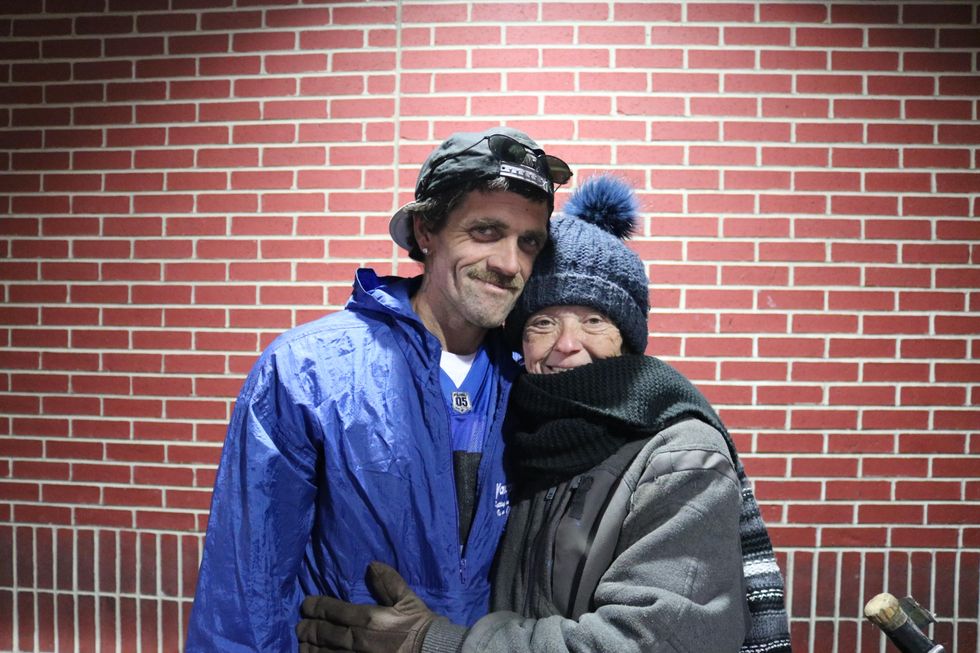
An opinion article that came out in The Bowling Green Daily News last year all but demonized the panhandlers that come around Fountain Square Park downtown. The article advised non-homeless residents to avoid humoring the panhandlers with donations of any kind.
Sharli Rogers, a member of the homeless and housing coalition of Southcentral Kentucky, says communities often close their eyes to the homeless issues in their towns.
“Sometimes the homeless in our community are folks that we don’t often see,” she says. “We don’t really realize how many homeless folks there are.”
Judy and Randy walk to Jumbo China Buffet on Campbell Lane and fill up two plates each of food before sitting in a corner table in the restaurant.
Everyone staring at them. A family a few tables away keep looking over their shoulders at them with dissenting glares. Judy and Randy don’t seem like they notice people staring. Randy is too distracted trying to get Judy settled and comfortable at the table.
“We both love chicken,” says Judy sitting down. Judy doesn’t have bottom teeth but she still always gets frog legs. It’s one of their favorite dishes at Chinese restaurants. Randy says his daughter turned him onto them.
Randy suddenly pulls two butters and three sour cream packets out of his pocket and hands them to Judy.
“I forgot I got these for you over there,” Randy laughs before digging into his own plate of food.
“We have fun together,” says Judy. “I watch him when he walks and twists his little skinny butt,” she laughs and takes a large bite of her frog legs.
Randy laughs too and licks his lips and flicks the pom-pon on Judy’s toboggan.
Randy leaves to get more food and Judy pulls out several tiny photo albums from the black bag Randy had brought in. Judy calls it her “Junk Bag.”
“Randy says I got too much junk,” she says.
The album is filled with photos of all of her nieces and nephews. Almost all of them are grown now and most of them have children of their own, children Judy hardly ever sees. The first picture Judy pulls out is a photo of her first husband’s child, Charles.
Then Judy flashes a picture of her second husband’s son, Noah, that she keeps in a tiny gold picture frame. Then a hairbrush that belonged to her dead sister. Then a picture of her grandmother. Then of her stepfather, Henry Clay, and her own father, Bill Martin, sitting on a yellow flowered couch together.
Randy comes back to the table and sits down and Judy leaves to go get more food. While Judy’s gone, Randy can’t help but talk about life on the street.
“It’s not real bad being homeless,” says Randy. “People look at you and start laughing at you. I think homeless people can work and that makes them lazy. It does hurt but what hurts more is not being with someone that they really care about. I should be doing more to get us a home,” says Randy.
Randy says he doesn’t ask Judy to do much. She sick and he knows that. He says she needs a home more than he does and it makes him feel bad that he’s not doing enough for her. Randy says his buddy is asking his landlord if they can get the apartment next-door and work to pay for it. He says he has a good feeling he’ll get the apartment.
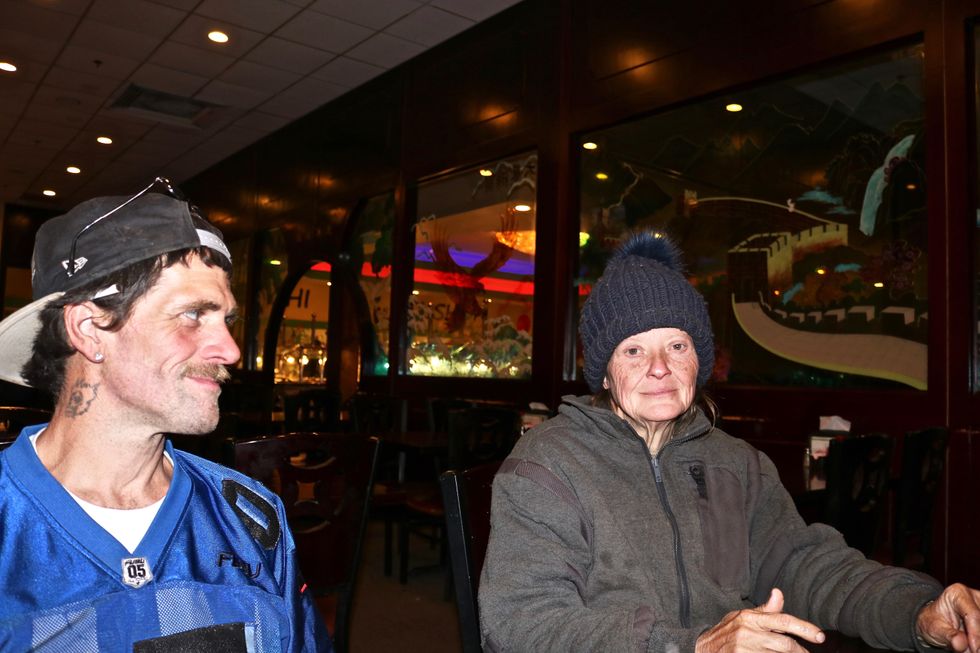
Some of his mint chocolate chip ice cream jumps onto the table, and he grabs a napkin.
“I want to get a home for Judy as a surprise,” says Randy, wiping up the puddle of melted ice cream.
He says he knows how to do concrete work and is hoping he can get a job doing that. Judy comes back to the table and opens her fortune cookie.
It reads: “there is someone owing so many thanks to you.”
“Those things ain’t true,” says Randy.
“But why wouldn’t they be true if they give them to you?” Judy asks.
“Wise men avoid troubles while fools search for them,” says Randy, throwing his unopened fortune cookie on a dirty plate and handing it to the waiter.



